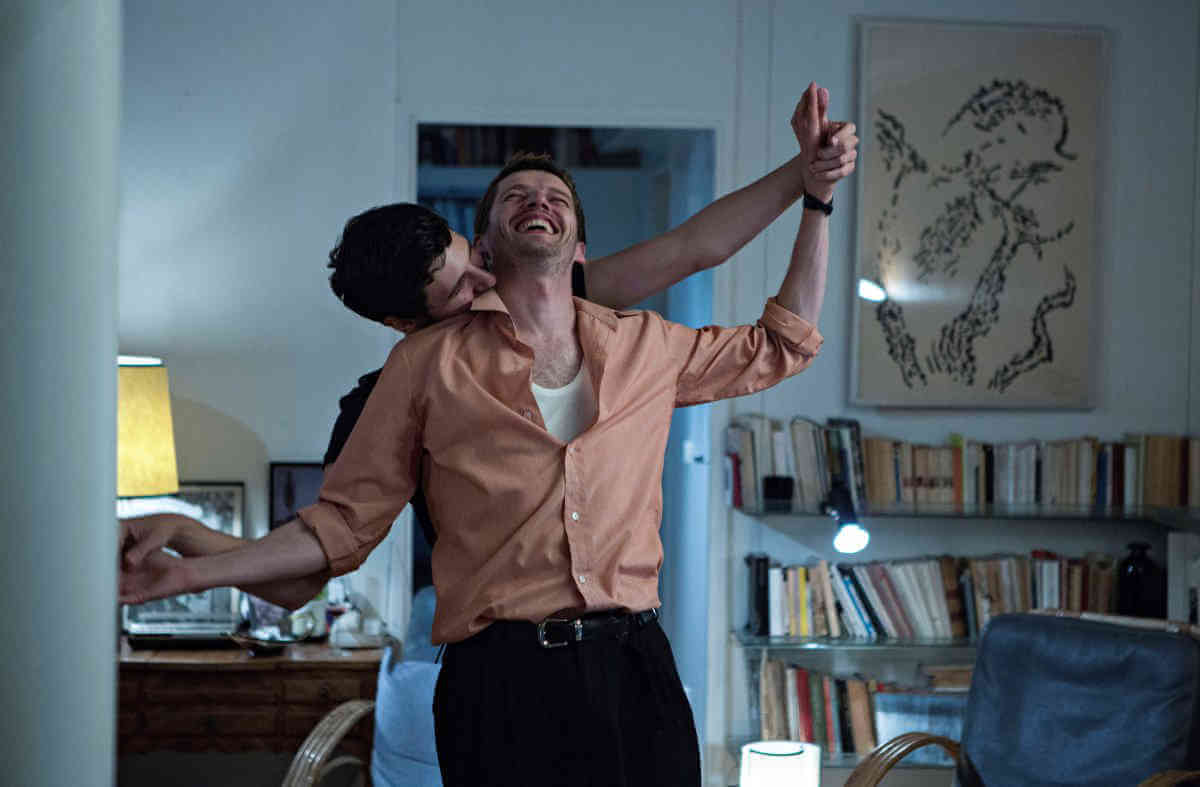Lean into the offbeat rhythms of out gay writer/ director Christophe Honoré’s sophisticated new film “Sorry Angel” and absorb all its romantic splendor. This intimate, affecting drama, set in 1993, alternates between Jacques (Pierre Deladonchamps), an HIV-positive writer in Paris, and Arthur (Vincent Lacoste), a Breton. There is an imbalance between them: Jacques is 35 and cynical, while Arthur is 22 and sentimental — so, of course, they belong together. As the protagonists slowly give in to their longing, viewers become invested in the guys coupling up. That’s the magic of Honoré’s film.
“Sorry Angel” opens with Jacques in Paris, having lunch with Jean-Marie (Quentin Thébault) before returning home to hear a voicemail from the dying Marco (Thomas Gonzalez) looking for a place to stay. Arthur is first seen with his girlfriend Nadine (Adèle Wismes), and then later he goes out cruising for guys. The two men connect when Jacques is invited to a cultural event in Rennes and he ducks into a movie theater, catching Arthur’s eye.
The guys chat in the cinema and arrange to meet later —a terrific scene in which Jacques, buttonholed by an actress, gives cues to Arthur to follow along until they can be alone. Once their date begins, there is a delicious frisson between them. They reveal bits about their lives to one another and look for a place to give in to their passions. When the guys are finally seen in bed together and Arthur peels off — and pockets — Jacques’s underwear, it’s enchanting. “Sorry Angel” captures a feeling of romance and intimacy that is so strong viewers may themselves feel some of the flush that comes from unexpected love. A letter Jacques writes to Arthur fills the screen with text at one point and includes the phrase, “Paris kisses on your salted butter skin.” It’s enough to melt the hardest of hearts.
But Honoré’s elliptical narrative approach keeps the men apart for much of the film, detailing their individual lives and other relationships. A scene back in Paris has Jacques encouraging Marco, who has moved in, to join him in the bath. As the men lie together and talk in the tub, the extent of their relationship becomes clear. Jacques’ feelings for Marco give depth and shading to his character. It’s a lovely scene and mirrors another, late in the film, when Arthur does a striptease and curls up with Jacques in his bed. Honoré may be making parallels between the two moments, but he leaves that to viewers to puzzle out. He is obviously more concerned with mood and emotion than plot.
To that end, the filmmaker includes a few fantasy moments such as one that occurs during a telephone call between Arthur and Jacques. The men are discussing Stéphane (Luca Malinowski), a blond hitchhiker Arthur has picked up for a tryst. Their conversation, about four different types of blonds features allusions to Whitman and Isherwood. It is a charming sequence that Honoré uses to push viewers to feel the growing attraction between these two men. If Jacques feels any jealousy, he doesn’t express it; he just imagines kissing Arthur’s face.
“Sorry Angel” does not get lost in the hazy fantasy of romance. The film features moments of real drama as when Jacques receives sad news. Jean-Marie tries to comfort him with sex, but grief just overwhelms Jacques. His emotions and pain put Jacques’ own life and health challenges into bold relief, and that may be what prompts him to redouble his efforts with Arthur. But when Arthur travels to Paris, complications ensue.
How things work out between the characters is best left for viewers to discover. Honoré features moments of levity, from three characters dancing or sharing a bed to more serious scenes of Jacques in a hospital. “Sorry Angel” also has Arthur waxing eloquently and philosophically about sex, youth, and identity, themes explored throughout the film. But Honoré overreaches a bit in the last reel, cramming too much into the story. He spends so much time slowly setting up his characters and their relationships that the conclusion, while elegant, feels rushed. Viewers may be disappointed when the film ends somewhat abruptly after more than two hours.
It’s hard not to care about thsee characters and want to see more of their love and their lives. Deladonchamps exudes an air of wistfulness that imbues Jacques with a palpable sense of regret. He wants to keep everyone at arm’s length, but he cannot help but give in to his feelings for others. Deladonchamps’ is a wonderfully nuanced performance. Lacoste is engaging as a young man who sees promise everywhere and acts, perhaps impulsively, even as he is still figuring out who and what he truly wants. He makes Arthur’s optimism sexy and appealing.
“Sorry Angel,” Honoré explains, is about a first and a last love. This melancholy romance will surely draw many into the deep emotions conveyed.
SORRY ANGEL | Directed by Christophe Honoré | Strand Releasing | In French, with English subtitles | Opens Feb. 15 | Quad Cinema, 34 W. 13th St. | quadcinema.com



































